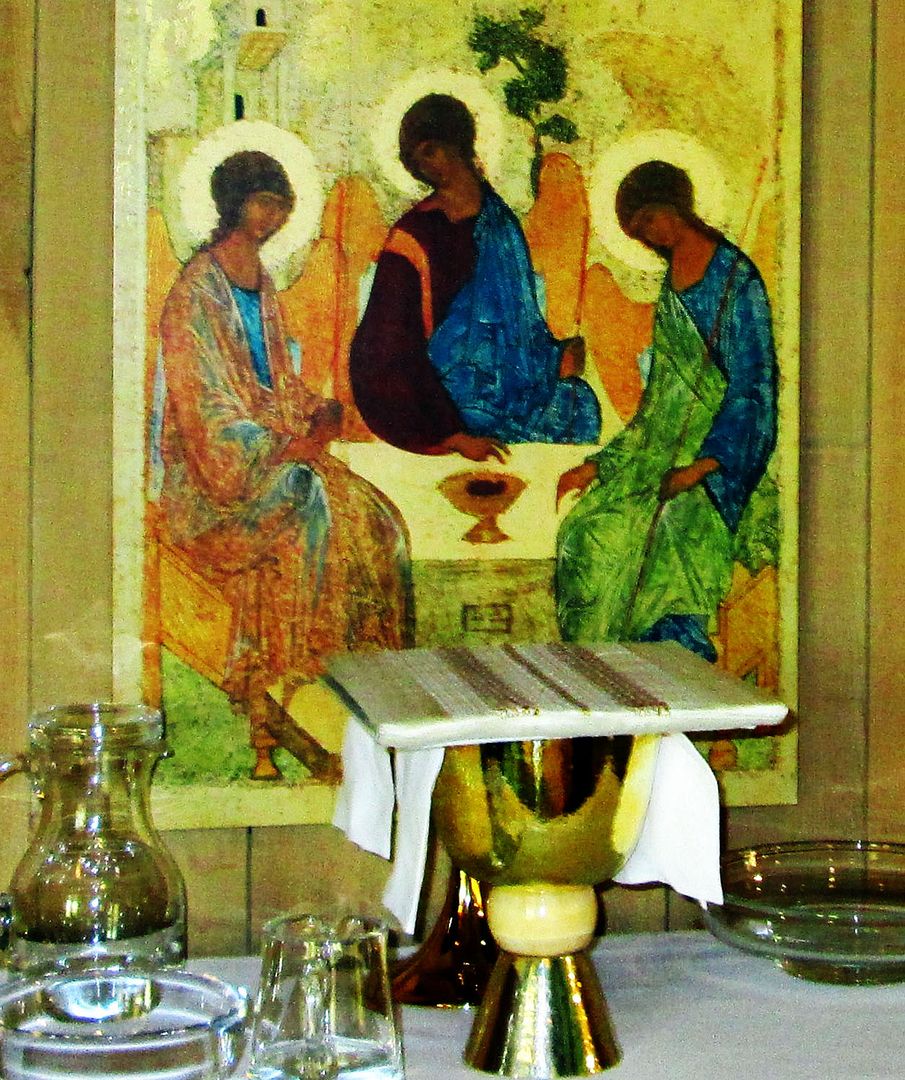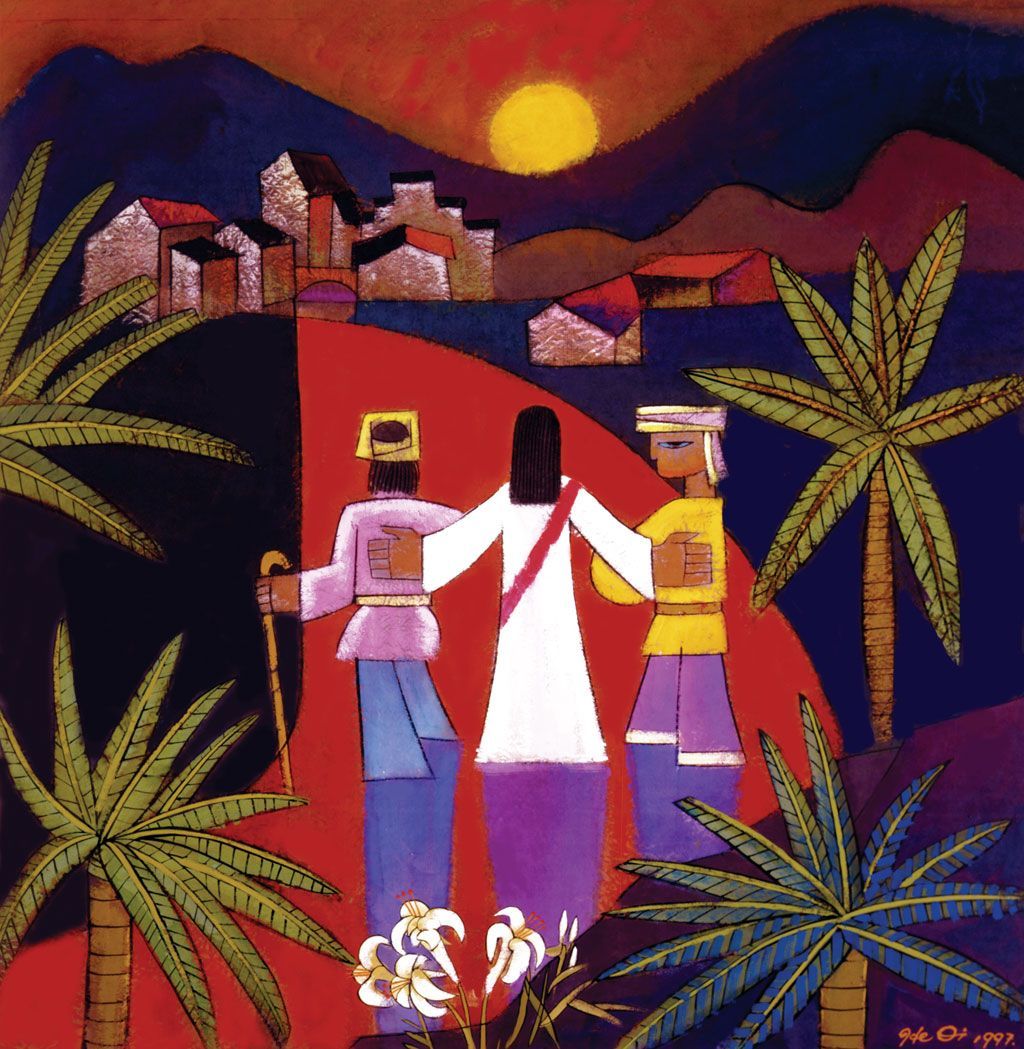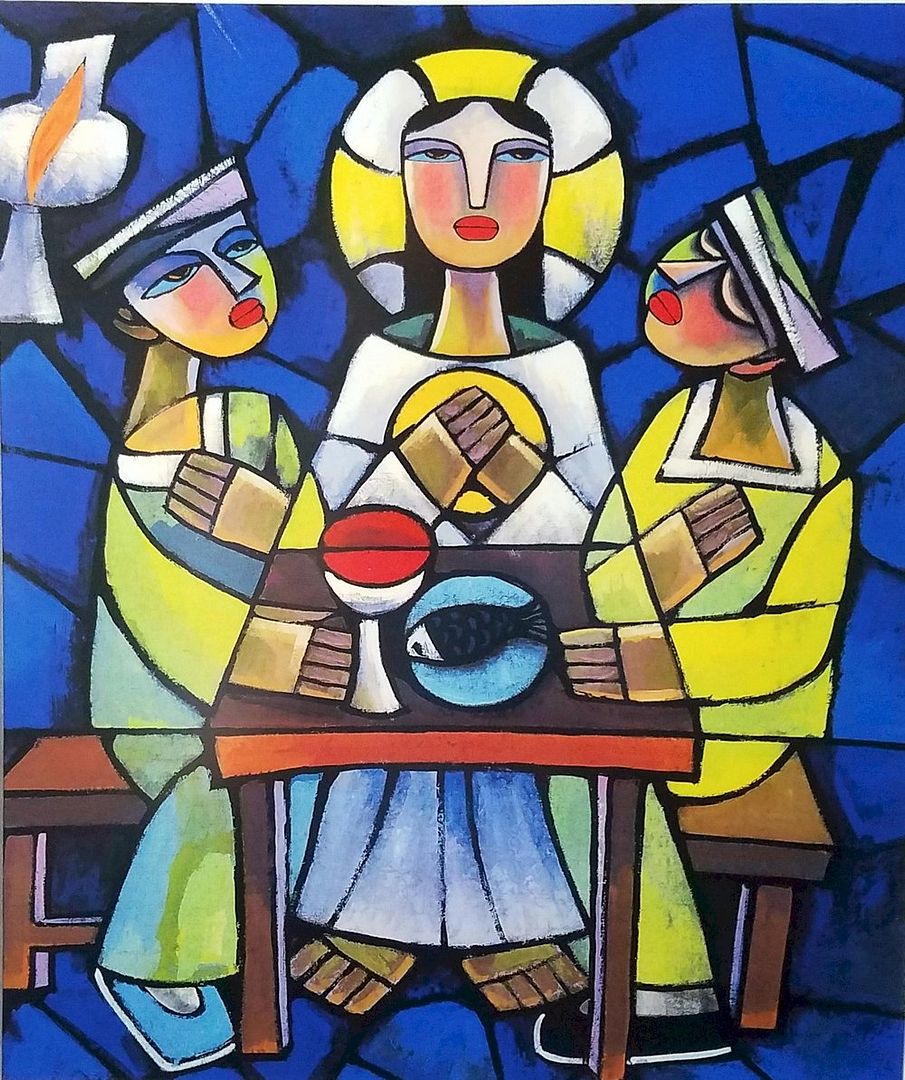Luke 24:13-35
13Now on that same day two of them were going to a village called Emmaus, about seven miles from Jerusalem, 14and talking with each other about all these things that had happened. 15While they were talking and discussing, Jesus himself came near and went with them, 16but their eyes were kept from recognizing him. 17And he said to them, "What are you discussing with each other while you walk along?" They stood still, looking sad. 18Then one of them, whose name was Cleopas, answered him, "Are you the only stranger in Jerusalem who does not know the things that have taken place there in these days?" 19He asked them, "What things?" They replied, "The things about Jesus of Nazareth, who was a prophet mighty in deed and word before God and all the people, 20and how our chief priests and leaders handed him over to be condemned to death and crucified him. 21But we had hoped that he was the one to redeem Israel. Yes, and besides all this, it is now the third day since these things took place. 22Moreover, some women of our group astounded us. They were at the tomb early this morning, 23and when they did not find his body there, they came back and told us that they had indeed seen a vision of angels who said that he was alive. 24Some of those who were with us went to the tomb and found it just as the women had said; but they did not see him."
25Then he said to them, "Oh, how foolish you are, and how slow of heart to believe all that the prophets have declared! 26Was it not necessary that the Messiah should suffer these things and then enter into his glory?" 27Then beginning with Moses and all the prophets, he interpreted to them the things about himself in all the scriptures. 28As they came near the village to which they were going, he walked ahead as if he were going on. 29But they urged him strongly, saying, "Stay with us, because it is almost evening and the day is now nearly over." So he went in to stay with them.
30When he was at the table with them, he took bread, blessed and broke it, and gave it to them. 31Then their eyes were opened, and they recognized him; and he vanished from their sight. 32They said to each other, "Were not our hearts burning within us while he was talking to us on the road, while he was opening the scriptures to us?" 33That same hour they got up and returned to Jerusalem; and they found the eleven and their companions gathered together. 34They were saying, "The Lord has risen indeed, and he has appeared to Simon!" 35Then they told what had happened on the road, and how he had been made known to them in the breaking of the bread.
COVID-19 lockdown
#SaferAtHome continues all over the world. Everyone hopes physical distancing with life fully integrated under one roof will result in declining infection rates and an eventual return to ... what we'd known as recently as earlier in 2020. Although I'm enjoying preparing a weekly reflection to blog each Saturday, being back on campus for live discussions will feel better than good.
Prayer
God of resurrection hope, God of our everyday doubts, thank you for accompanying us everywhere, and especially "thank you" for staying in quarantine with us. Thank you again for all the first responders, health care heroes, essential community workers. And for technology that helps us connect!
In the name of Jesus Christ, crucified, risen, and with us always—
Amen!
Scripture Unfolds
The gospels were written down more than a generation after Jesus' death; up until then, people sometimes told about, occasionally wrote about, their experiences with him. We've discussed how the dynamic, fluid oral tradition wasn't simply a memorized rote retelling, but took on additions, elaborations, and (especially) interpretations during the process; as a result, besides observable happenings, scripture includes perspectives that add density and meaning.
Easter Evening
Emmaus was a common place name that probably came from a Semitic word meaning warm spring; as Luke explains, this particular Emmaus probably was (the biblical number of!) seven miles from Jerusalem. Today's travelers along the way incident from St. Luke always is the appointed gospel for Easter evening—together with the Feast of Fat things from Isaiah 25:6-9. Last week we heard about two consecutive Sunday evenings in the upper room from St. John, the first from Easter evening. Which really happened on resurrection Sunday evening? Several simultaneously? Despite gentile physician Luke's attention to Jewish history and world history that starts as he places his gospel right here right now, two millennia ago the post-enlightenment discipline of doing history by uncovering and interpreting sources hadn't evolved, so history in the bible makes different assumptions than Western Civ 101, World History 100, or History of Science 380 at the University or Community College all default to. Best guess is all these events occurred quite early in Jesus' post-resurrection ministry.
Showing the Story



• First image is The Hospitality of Abraham / Abraham's Visitors. Andrei Rublev drew this trinitarian icon of the Genesis 18:1-15 narrative of Abraham's three visitors. The side of the table closest to us is wide open—a place for each of us at God's table of grace! [A couple hours after posting: I just realized this is my own photo of "Abraham's Visitors" above the credence table at one of my Previous City / San Diego churches. I copied the code from my main blog, but didn't think to look at the entire picture.]
• Next, Emmaus Road by contemporary artist He Qi illustrates the Easter evening conversational encounter along the road from Jerusalem to Emmaus.
• You've probably noticed the third, brightly colored Supper at Emmaus painting by He Qi that moves around the church parish hall accompanied by a photo of Pastor Ittu with the artist? After the two travelers invite Jesus-as-stranger to stay with them for the evening, they meet the risen Christ as simultaneously guest and host. There, also, Jesus welcomes us with an open seat on our side of the table. Art by Rembrandt, Caravaggio, and many others depict this event.
Telling the Story
Easter is a week of weeks, a season of 50 days that fills about 1/7 of the year. This is Day 15, the third Sunday of Easter and we're stuck in a global pandemic, a virus that has affected "all the people" in some way or another. Feels more like death than life. Everything around us seems deadly.
Conversation partners Cleopas and friend had known real-life Jesus; they knew the authorities had sentenced him to death. Jesus had been crucified. Jesus was dead. They'd heard about an empty tomb, and heard rumors an empty grave might mean Jesus no longer was dead, but they hadn't experienced resurrected Jesus themselves. Like most, they'd probably imagined Israel's redeemer would bring lavish opulence of a restored Davidic monarchy, or something similarly ostentatious. So apparently this Jesus was not the promised Messiah, after all? But they "had hoped."
Cleopas and companion once "had hoped" but now despaired because it's already the third day after Jesus' death (their calendar considered a day or part of a day as an entire day, thus the third day). If Jesus of Nazareth was The Redeemer, why would he die? Where was God's promised redemption in all this?
Christianity's Easter faith is about hope. With Cleopas and friend, we've learned to live in hope despite being surrounded by death and destruction. Along with Cleopas and friend, we tend easily to give up hope, to make assumptions based on appearances. In addition, humans don't need to have achieved much chronology to realize Easter doesn't mean the end of loss, disappointment, and death.
• Luke 24:25-27
And then Jesus himself tells the story, including the part about the Messiah needing to suffer before being raised to glory...
Being the Story
Two Sundays ago the church celebrated an Easter unlike any Easter we've known. In early March, the church left the building, but not in our usual way of returning to home and work after gathering around word and sacrament, enjoying a tasty brunch, and then living as Jesus' presence wherever we ventured. The church left the building because the authorities told us to, placing countless restrictions on where and how any non-essential personnel could go. The first Sunday after the first full moon after the vernal equinox came and went. But it never felt like Easter. We didn't gather on Saturday to polish the silver, to hang white bunting from the ceiling, to arrange flowers. Those of us who don't consider it Easter without Easter Vigil and/or Easter Sunrise services (I need both, I really and truly do) didn't get those, either. It didn't feel like Easter. It still doesn't feel like Easter. We keep getting updates of county-wide and worldwide COVID-19 cases and deaths. It feels more like the empty devastation of Friday evening, of all day Saturday, as if death reigns, as if the Day of Resurrection never broke into history with the reality of new life, the death of death.
Every scriptural mention of bread, wine, or water isn't necessarily a sacrament! But every instance of creation's good gifts provides sacramental evidence of God's presence, God's abundance, God's promised future. Like travelers from Jerusalem to suburban Emmaus, we recognize Jesus our invited guest who then becomes our host when he welcomes us by taking, blessing, breaking, and giving the bread that's his body, the sustenance that becomes our lives.
Remember the eighth day we talked about for Easter Sunday? Jesus' resurrection happens on the first day of the week, a first day that's also the eighth day, the (surprise!) first day of a new creation—and it's the third day Cleopas mentions. Two thousand years later, we still live in the eighth day theology of God's redemptive re-creation of all that's been broken, discarded, decayed—everything that's no longer alive. As we continue to wait and watch through this long, long Saturday, God promises Easter will happen.
God Sightings
"God sightings! What? I thought God's presence was hidden."
• Matthew 28
7Then go quickly and tell his disciples, "He has been raised from the dead, and indeed he is going ahead of you to Galilee; there you will see him.' This is my message for you." ... 10Then Jesus said to them, "Do not be afraid; go and tell my brothers to go to Galilee; there they will see me."
• Luke 24
28As they came near the village to which they were going, he walked ahead as if he were going on.
Jesus goes ahead into places and situations before we do. Jesus will meet us when we get there? The women's testimony of the stone rolled away and the empty grave is true. Jesus will meet you when you get there; he'll already be there by the time you arrive. Yes! Jesus went to Galilee before his disciples did—they would see him there because he previously had arrived. A God-sighting?
But I thought God's presence was hidden!
Yes, it often is! Look at the Bethlehem manger. Look at the cross. Isn't Jesus' identity and presence hidden in the stranger Cleopas and friend don't immediately recognize, even though they've previously known Jesus, though they've just recently been talking about him? They (suddenly! an aha! moment God-sighting!) recognize Jesus as he takes bread, blesses it, breaks it, and gives them the bread that's his body, the bread that's basic life sustenance. Jesus, born in Bethlehem, little town of House of Bread.
Like Cleopas and friend, we've learned to recognize Jesus as the guest we invite, the guest who becomes our host when he takes, blesses, breaks, and gives us the bread that's his body, that becomes part of our lives. And then we go out and continue to trust the story, to tell the story! Death is not the end.
• Do you know this song?
I'm gonna sit at the welcome table
I'm gonna sit at the welcome table, one of these days
I'm gonna eat at the welcome table, one of these days!
I'm gonna eat at the welcome table,
I'm gonna feast on milk and honey,
I'm gonna feast on milk and honey, one of these days!
I'm going to eat at the welcome table...
Oh, yes, we did! And we will again!